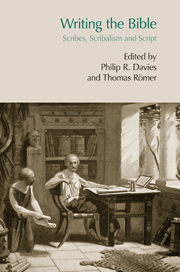Book contents
- Frontmatter
- Contents
- Abbreviations
- 1 Introduction
- I Writing in the ancient world
- II Hebrew Bible and early Judaism
- 4 The dissemination of written texts
- 5 Genesis: a composition for construing a homeland of the imagination for elite scribal circles or for educating the illiterate?
- 6 The “Prophets” as scriptural collection and scriptural prophecy during the Second Temple period
- 7 From prophet to scribe: Jeremiah, Huldah and the invention of the book
- 8 Instituting through writing: the letters of Mordecai in Esther 9:20-28
- 9 The Scribe and his class: Ben Sira on rich and poor
- III Early Judaism and early Christianity
- Index of biblical and other ancient sources
- Author index
8 - Instituting through writing: the letters of Mordecai in Esther 9:20-28
- Frontmatter
- Contents
- Abbreviations
- 1 Introduction
- I Writing in the ancient world
- II Hebrew Bible and early Judaism
- 4 The dissemination of written texts
- 5 Genesis: a composition for construing a homeland of the imagination for elite scribal circles or for educating the illiterate?
- 6 The “Prophets” as scriptural collection and scriptural prophecy during the Second Temple period
- 7 From prophet to scribe: Jeremiah, Huldah and the invention of the book
- 8 Instituting through writing: the letters of Mordecai in Esther 9:20-28
- 9 The Scribe and his class: Ben Sira on rich and poor
- III Early Judaism and early Christianity
- Index of biblical and other ancient sources
- Author index
Summary
THE FESTAL LETTERS FOR FOURTEENTH AND FIFTEENTH OF ADAR
The biblical story of Esther and Mordecai concludes with the report of the victory of the Jews of the Persian empire over their enemies. The conflict begins with a decree promulgated by Haman ordering the massacre of all Jews. Although Haman ends up on the gallows, the king cannot reverse his decree. Hence, Esther 9:1-19 narrates the two-day fight during the thirteenth and fourteenth Adar, and the festivities that followed (vv. 16-19). Letters are then sent to the Jews of the empire to set up an annual commemoration of the events. Esther 9:20-28 mentions Mordecai's letters to institute the festival, while 9:29-32 mentions the confirmation of these letters by Esther and Mordecai. Verse 28 produces a satisfactory conclusion, while verses 29-32, not considered here, are usually considered secondary since they are absent from Josephus, Ant. 11.284-296 and the Lxx's text of those verses is very confused (Clines 1984a: 166–7; Meinhold 1983: 93; Loewenstamm 1971; Moore 1971: 95). The account reads as follows:
(20) Mordecai recorded these things, and sent letters to all the Jews who were in all the provinces of King Ahasuerus, both near and far, (21) enjoining them that they should keep the fourteenth day of the month Adar and also the fifteenth day of the same month, year by year, (22) as in the days on which the Jews gained relief from their enemies, and in the month that had been turned for them from sorrow into gladness and from mourning into a holiday; that they should make them days of feasting and gladness, days for sending gifts of food to one another and presents to the poor.[…]
- Type
- Chapter
- Information
- Writing the BibleScribes, Scribalism and Script, pp. 97 - 107Publisher: Acumen PublishingPrint publication year: 2013



